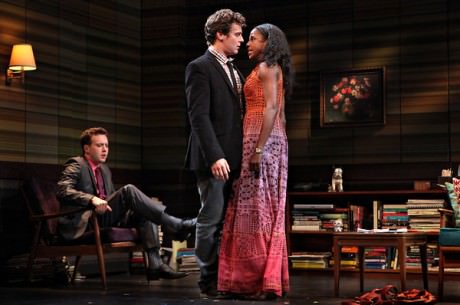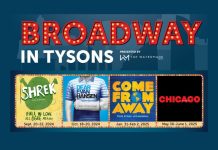Jeff Talbott’s Award-winning The Submission opens at Olney Theatre Center on May 9th. Jeff enlightens us on the history of his play and the new Olney production.

Joel: Why did you want to have The Submission produced at Olney Theatre Center, and when were you first contacted about having your play produced there?
Jeff: The play is licensed through Samuel French, so I actually have very little to do with who produces it. That said, I am completely thrilled Olney chose to produce the play; it’s a terrific theatre with a rich and fantastic history, so to have The Submission now be part of that history is something I’m very excited about. I have to say, the staff of the theatre has been so incredibly supportive and jazzed about the play, and that means so, so much to me.
When did you write The Submission, what’s it about, and how is the Olney production different than the wonderful MCC production which starred Jonathan Groff, which I saw and loved?
I finished a draft of The Submission late in 2009; MCC Theater started developing the play in the summer of 2010; it won the Laurents-Hatcher Award in spring of 2011 and was produced off-Broadway in fall of 2011. I list all of those dates in one sentence because it was a remarkable, once-in-a-lifetime sequence of events, and it all happened (from sending out a draft to closing night) within two years. In Playwriting and that is just freaking unbelievable. I still shake my head when I think of it.
How is the Olney production different?
Well, different director and actors, which means a whole different approach. Also, the published version (and this production) features my final rewrites, which occurred after the play closed Off-Broadway, and includes things I learned watching the play with an audience while it ran in New York.
How much of the play is autobiographical and how much is not?
That’s a tough question. In the “write what you know” world, every play is autobiographical. But if I truly wrote only what I know, my plays would all be about my cat. That said, there’s some of me in there – when I was in grad school I had a complicated conversation (which is fancy talk for a fight) with one of my classmates/friends about how one person’s experience with prejudice might or might not make it possible to have a window into another person’s experience. I based Danny and Emilie’s first moment of misunderstanding on that event in my life, and then relied on my imagination for the rest. And whenever Danny talks about what it’s like when he writes, that’s a fairly personal look into my diary.
How much of your own personality, quirks, and habits are in all four characters? Were these characters based on family members and/or friends?
The characters are not based on anybody I know. They are themselves, wholly themselves. They are people to me. I spent a couple of years getting to know them while I wrote the play, and I feel very protective of all four of them. The act of writing a play is about getting to know the characters and then getting out of their way and letting them talk. And for me, it’s also about feeling very responsible about getting it right for them. Making sure that I don’t let any of them down while getting their story onto the page. That doesn’t always mean showing them in their best light – but I try very hard to show them in their truest light.
What does Shaleeha G’ntamobi mean and how did you come up with it? Do you know someone with that name?
As Emilie says in the play “It’s not a name.” It’s something I made up for Danny to make up that tells the audience something about Danny.
As you mentioned above, you were awarded the inaugural Laurents-Hatcher Award. How has winning this award changed your career and life?
In every way. Honestly. The goal of the Award is to find an unknown writer and give them a jumpstart, and it did just that. I am indebted to Arthur Laurents for creating it; he literally changed my life and I got to tell him that before he passed away. He loved this play, and I hope he would like the ones that follow just as much.
When did you first get the ‘theatre bug’ and when did you first decide you wanted to become a playwright? Where did you get your training and what was your first attempt at writing a play?
The first play I did was called Olaf Reads. I was in kindergarten. I played Olaf. That was kind of it for me. I started writing in earnest when I was in grad school (for acting). I wrote two long-form one-acts that were produced while I was at Yale, and then I kept writing after I got out of school. I honestly didn’t think anybody would ever notice, but I’m pretty grateful I turned out to be wrong about that. I write every day, and have four new plays that are now out there looking for homes.

Introduce us to the cast and director. What do you admire most about their performances and direction?
David Elliott is directing the play. He’s a smart, smart guy with a passionate attachment to the piece. And he also has a very real desire to get to the heart of the matter, which is vital for this play. The cast is completely off the hook. Seriously. Frank De Julio plays Danny, Kellee Knighten Hough plays Emilie, Ari Butler plays Pete and Craig Dolezel plays Trevor and they have impressed me greatly with their fearless attack on the piece. I don’t make it easy on actors, my dialogue is fast and specific; but they are ninjas. I can’t wait for people to see what they’ve come up with.
When you watch a new production of the show, what goes through your mind? Do you see things that you wished you could have changed or improved on?
The play hurts my stomach. I tend to sit in one position and not move a whole lot for the 100 minutes of the play. I know the punch(es) the play has up its sleeve, and I feel each blow before the audience does That said, I do love that the play starts a conversation, because that’s what it wants to do: get people talking. And I’m happy to say it gets them laughing, too. But what goes through my mind while watching it, for the most part, is “uh-oh, they have no idea what’s coming…”
If you had a chance to make some changes now, what would they be?
At some point you have to put down your pencil and say “done.” I did that when the play was published. For better and/or worse it’s pretty much exactly what I meant it to be.
What line or lines makes you grin and say, “That is really damn good!?
Oh gosh, I really don’t think like that. Usually if something comes out particularly well, I think “who the hell wrote that?” Because 11 times out of 10 I honestly don’t remember writing it.
Have you been involved with cast decisions and rehearsals at Olney and what advice and suggestions have you made to the cast and Director David Elliot, and what kind of questions have they asked you?
I sat in on the auditions in New York, where two of the actors were cast, and I’ve been to some of the rehearsals, but in both cases I was just there as a resource. It’s very much David’s production, and I’m just around to answer questions. Obviously, I know some things about the play, but once you write ‘em, you have to let other people do ‘em. And that act of interpretation is one of the most gratifying, moving things I have ever experienced. Ever.
The PR for the show states, “Controversial themes of race and sexuality are part of the mix.” What themes of race are controversial in the play and what has been the reaction of the African American community to The Submission? What reactions have shocked you or surprised you, or impressed you, and what have you learned from these reactions?
I recognize that with race and gender politics as topics it’s impossible for the play to not be perceived as being about those things, but it was never about any of that for me. It’s about how ill-equipped we are to talk to each other, and how we should strive, every day, to do what Trevor asks Danny to do: “Find better words.” It’s so easy for a conversation about any potentially inflammatory topic to become about the topic itself, and it is probably not possible to neutralize the words we use to discuss these things, but the topics are not going to go away, so we should keep trying to be kind to each other and find ways to listen completely to each other.
As to reactions from the African-American community, I can’t speak to that, except to say reactions have been have been as varied and complicated as the issues the characters in the play are wrestling with. People are people, and trying to iris down to one group’s (or one person’s) reaction is as dangerous as making broad generalizations. What does continue to be the most fascinating aspect of watching audiences deal with this play is how every single audience takes the ride completely differently – and what is gratifying is that the ride seems to toggle back-and-forth as Danny and Emilie get deeper and deeper into it. Hopefully they are each about 50% wrong and 50% right, and I worked very hard to keep you jumping from side to side.
What have you learned as a playwright since you wrote the play and since its success?
Hm. I dunno. I just keep writing, and each play teaches me new things about my developing craft. I have a fairly particular way of letting my people talk, and I trust them to take care of their stories for me. That sounds awfully artsy-fartsy, I know, but it’s just plain true.
What advice would you give a young playwright who is considering using someone else’s name as the playwright’s name when they are submitting his/her new play for a play festival?
It’s a ridiculous and TERRIBLE idea. Don’t you think?
The Submission plays from May 9th through June 9, 2013 at Olney Theatre Center – 2001 Olney-Sandy Spring Road, in Olney, MD. For tickets, call the box office at (301) 924-3400, or purchase them online.





